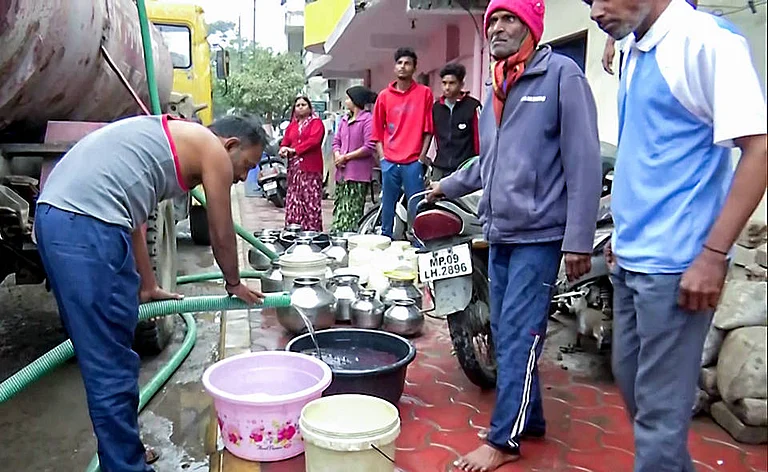Russian authorities on Tuesday detained three persons in connection with a suspected outbreak botulism outbreak. This comes after several people across four different regions were hospitalised with symptoms of the rare disease.
The outbreak has reportedly been linked to ready-to-eat salads, which is made by popular delivery service. The Investigative Committee, Russia's top investigations agency, said that the authorities detained two top managers of the delivery service and a head of the company which produces canned beans.
The three persons were detained as part of a criminal inquiry on charges of making and distributing products that violate the safety standards.
However, the status of whether these three people were charged or kept in custody remained unclear.
Foodborne botulism is a common type of botulism which is caused by eating foods that have been contaminated with botulinum toxin. This rare and dangerous disease can cause paralysis, breathing difficulties and sometimes death.
Reportedly, as many as 121 people sought treatment for suspected botulism on Moscow, said deputy mayor Anastasia Rakova on Monday. Of these, she noted, 55 persons were in serious condition and 30 under intensive care.
Local health officials told Russian news agency Interfax that in the outlying Moscow region, 20 persons, including 12 in critical conditions, have been hospitalised with a preliminary diagnosis of botulism.
In the Nizhny Novgorod region about 400 kilometres east of Moscow, a total of 14 persons were diagnosed and hospitalised with botulism.
Additionally, 14 more people were hospitalised with botulism in the city of Kazan, which is located about 700 kilometres of Moscow, local health watchdog Rospotrebnadzor reported.
Initially, health officials linked at least some of the cases in Moscow with two brands of ready-made salads. Rospotrebnadzor brought the sale of these salads to a halt pending investigation on Saturday, which was when the first cases of poisoning were reported.
However, authorities -- by Tuesday -- were only found to be looking into one of the two salads, which was made and sold by popular delivery service Kukhnya Na Rayone. This service operates in Moscow, Kazan, Nizhny Novgorod and several other cities.
Kukhnya Na Rayona suspended its operations over the weekend, saying that it no longer offered the salad, which contained canned beans in it. In its statement online, the service said that it would inspect other foods that it makes as well.
Officials did not definitively inform whether it was the salad or the canned beans that was contaminated. However, a criminal investigation has been launched.
According to the Investigative Committee, Director of Kukhnya Na Rayone -- Anton Lozin, the head of its quality department -- Yelena Mashkova and the head of Savon K -- Vladimir Shin -- a company which makes canned beans, have been arrested.
WHAT IS BOTULISM?
According to the Centers for Disease Control and Prevention, Botulism is a rare but critical illness which is caused by a toxin that attacks the human body's nerves.
The disease causes difficulty in breathing, muscle paralysis and even death.
The toxin is made by a particular bacteria/germs known as Clostridium botulinum and sometimes Clostridium butyricum and Clostridium baratii.
These bacterias, found naturally in several places, make spores which act like a protective coating. These spores help the bacteria thrive in the environment, even in extreme conditions, CDC said.
Improperly home-canned, preserved or fermented foods can provide the right conditions for these spores to grow and make the botulinum toxin.
COMMON SYMPTOMS OF BOTULISM
Some common and typical symptoms of botulism can include:
Severe abdominal pain
Vomiting
Diarrhea
Blurred vision
Dry mouth
Difficulty swallowing or speaking
Neurological symptoms
5 COMMON KINDS OF BOTULISM
Foodborne Botulism: This happens by eating foods that have been contaminated with the botulinum toxin, CDC said. Common causes are homemade foods that are improperly canned, preserved or fermented. Though uncommon, store-bought foods could also be intoxicated with botulinum.
Wound Botulism: This can happen if the spores enter a wound and make toxin, which is highly prone in those who inject illicit drugs. People with traumatic injuries or surgery can also get wound botulism.
Infant Botulism: The reasons for some infants getting botulism are unknown, however the spores get into their intestines, where they grow and make the toxin.
Iatorgenic Botulism: This happens if excessive botulinum is injected for cosmetic purposes, such as wrinkles or for medical reasons, such as migraine.
Adult Intestinal Toxemia: Also known as adult intestinal colonisation, this is a very rare kind of botulism. This occurs when the bacteria enters an adult's intestines, grows and produces the toxin, in a way similar to the infant botulism. The reasons behind this type of botulism is unknown, CDC noted.
Notably, investigation into the suspected outbreak in Russian cities is underway.
(With agency inputs)



























